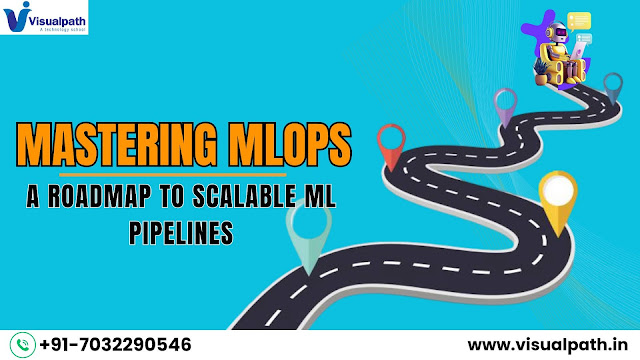- Get link
- X
- Other Apps
Mastering MLOps: A Roadmap to Scalable ML Pipelines
In the rapidly evolving world of
artificial intelligence, MLOps Training
has become essential for organizations looking to deploy and manage machine
learning models efficiently. MLOps (Machine Learning Operations) ensures
the seamless integration of ML models into production by automating workflows,
improving model reliability, and streamlining infrastructure. As more
businesses adopt AI-driven solutions, understanding scalable ML
pipelines is crucial for long-term success. If you're looking to
gain expertise in this field, enrolling in an MLOps Online Course can be
a great step.
 |
| Mastering MLOps: A Roadmap to Scalable ML Pipelines |
MLOps is a set of practices that
combines machine learning, DevOps, and data engineering to manage the
lifecycle of ML models efficiently. It focuses on automating workflows,
improving model reliability, and ensuring seamless integration into production
environments. With the rise of cloud computing
and big data, MLOps plays a crucial role in optimizing ML model
deployment and monitoring.
1. Data
Management and Versioning
Effective MLOps begins with proper
data management. Organizations must ensure:
·
Data quality,
consistency, and governance
·
Use of tools
like DVC (Data Version Control) for tracking data changes
·
Secure
storage solutions such as AWS S3, Google Cloud Storage, or Azure Blob
2. Model
Development and Experimentation
A successful ML pipeline
requires continuous experimentation and model versioning. Best practices
include:
·
Using MLflow
or Weights & Biases for tracking experiments
·
Implementing
automated hyperparameter tuning
·
Ensuring
reproducibility across environments
3. CI/CD for
ML Models
Continuous Integration and
Continuous Deployment (CI/CD) pipelines
automate the training and deployment of ML models. Key steps involve:
·
Automating
testing of model performance
·
Integrating
version control systems like Git
·
Deploying models
using Kubeflow, TensorFlow Serving, or Docker containers
4. Model
Monitoring and Performance Tracking
Once deployed, ML models must be
continuously monitored to detect performance degradation. Effective monitoring
includes:
·
Tracking
model drift using tools like Evidently AI
·
Logging
real-time predictions and feedback
·
Implementing
alert mechanisms for anomaly detection
5. Security
and Compliance in MLOps
Ensuring security and regulatory
compliance is crucial in ML pipelines. Organizations should:
·
Implement
role-based access control (RBAC)
·
Encrypt
sensitive data and model artifacts
·
Follow
compliance standards like GDPR, HIPAA, or ISO 27001
Steps to
Building Scalable ML Pipelines
Step 1:
Define Clear Objectives
Begin by identifying the business
problem and expected outcomes of the ML pipeline. Align objectives with
organizational goals to ensure measurable success.
Step 2:
Automate Data Processing
Use automated ETL (Extract,
Transform, Load) processes to streamline data ingestion and preprocessing.
Tools like Apache Airflow and Azure Data Factory help manage
workflows effectively. MLOps
Training Online
Step 3:
Standardize Model Training and Evaluation
Establish a structured approach to
model training, evaluation, and deployment. Automate the process using
cloud-based MLOps platforms such as AWS SageMaker or Google Vertex AI.
Enrolling in an MLOps Training program can provide hands-on experience
in model development and deployment.
Step 4:
Deploy Models at Scale
For scalability, leverage
containerization and orchestration tools like Docker and Kubernetes to
deploy models across distributed systems.
Step 5:
Implement Continuous Monitoring and Feedback Loops
Integrate real-time monitoring
dashboards and feedback loops to ensure model accuracy and reliability over
time.
Conclusion
Mastering MLOps is essential
for organizations aiming to scale their ML pipelines efficiently. By
adopting best practices in data management, CI/CD, model monitoring, and
security, businesses can ensure seamless ML model deployment and long-term
success. As AI-driven applications continue to grow, implementing robust MLOps
strategies will be key to staying competitive in the market.
For those looking to enhance their
expertise in this domain, enrolling in an MLOps Training Course
can provide hands-on experience in managing and automating ML workflows.
Additionally, professionals seeking flexibility can opt for MLOps Online
Training to gain in-depth knowledge while balancing their schedules.
Trending Courses: DevOps,
GCP
DevOps, and Azure DevOps
Visualpath is the Leading and Best Software Online Training Institute
in Hyderabad.
For More
Information about MLOps
Online Training
Contact
Call/WhatsApp: +91-7032290546
- Get link
- X
- Other Apps
Comments
Post a Comment